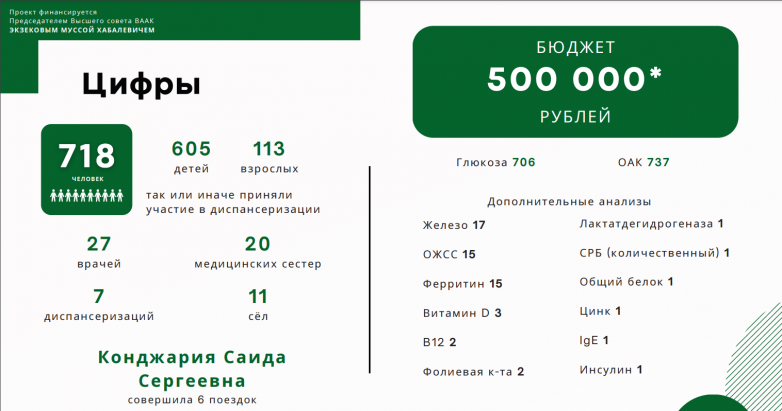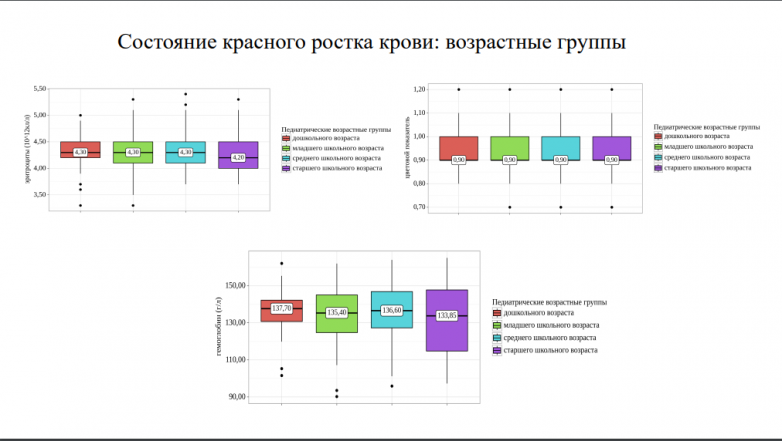The World Abaza Congress summed up the preliminary results of the first stage of the prophylactic medical examination project for students and teachers of rural schools in Abkhazia, carried out with the support of the Ministry of Health of Abkhazia.
Summing up the results of the first stage of the WAC project on medical examination of students and teachers in rural schools took place in the round table format. As a result of medical examination, 27 doctors and 20 nurses conducted a medical examination of 718 people, of which 605 schoolchildren and 113 teachers.
The project is financed from the personal funds of Mussa Ekzekov, Chairman of the Supreme Council of the World Abaza Congress. The second stage of medical examination of schoolchildren is scheduled for the beginning of the school year in September 2023.
The meeting was attended by doctors of various profiles who participated in the medical examination, Deputy Minister of Health Saida Delba, First Deputy Minister of Education Ada Kvarchelia, Children’s Ombusperson Maktina Dzhindzholia, Commissioner for Human Rights Anas Kishmaria, head of the MedLife private laboratory Larisa Akhuba, chief physicians from a number of medical institutions of the republic, representatives of non-governmental organizations.
According to the organizers, it was important for them to cover the maximum number of schoolchildren for an in-depth analysis of the level of physical health of rural children.
Opening the round table, the author of the project, the head of OSAZ, Izolda Khagba, told about the importance of discussing the results of medical examinations with doctors who were directly involved in the field trips, and with the Ministry of Health.
"This project has become one of the most beloved for our team. Each trip brought great satisfaction to us and the doctors, as we all felt that we were participating in something very important and useful. It has long been known that early diagnosis of most diseases is the key to successful treatment. A medical examination of schoolchildren revealed various problems, and several rather serious pathologies were also identified, which neither the children themselves nor their parents knew about. It is important that in the absence of a timely response, these diseases could greatly affect the future of children. For us, this is already a result, because at least one life changed for the better is a victory," Khagba said.
OSAZ specialist Naur Khishba, said that during some trips it was possible to combine examination of students and teachers of two neighboring schools into one trip. Thus, the preparation and implementation of the project in each village took place in three stages. The first stage is the arrival of the WAC staff and a discussion of the upcoming examination, the second stage is the collection of blood from schoolchildren for general analysis and glucose levels, the final stage is the examination of schoolchildren and teachers by doctors with the results of the tests already available.
"The WAC prepares "medical cards" for each student, where their full name, date of birth, parent’s phone number, height, weight, body mass index, doctor’s specialties with the recommended visiting order are already printed. The results of the tests are attached to the cards. Doctors record information about children's health and their recommendations in "medical books", which children take home after medical examination. An online form is also being prepared in which volunteers work, and in which the same data is entered in electronic form. This is done to keep doctors' notes, which we then analyze," Khishba said.
Valery Dzhinzholia, a junior researcher at NIIEPiT, presented the full statistics of medical examinations and population data for the studied areas.
Based on the results of the analyzes, demographic data, the frequency of occurrence of various diseases (neurological, ophthalmological, endocrinological profile), schoolchildren‘s state of red and white blood sprouts were revealed (link to statistics).
"Analysis of the results obtained is important, since a multidisciplinary integrated approach to the results of clinical examination will allow us to identify a number of key aspects for the effective operation of the healthcare system. Since medical examination has several goals: helping each patient, prevention and early detection of diseases, identifying the frequency of various diseases among the population, identifying deficiencies, and creating references for a specific population. I believe that working with these data and conclusions on them are important in order to plan the activities of the Ministry of Health," said Dzhindzholia.
Deputy Minister of Health Saida Delba emphasized the high level of organization of the entire medical examination, appreciated the analysis of the work and assured of readiness to assist in the next stages.
"What you did in this situation, how you organized and conducted it all, were able to coordinate the activities of all our specialists - this is an example of how it should be! The first stage of medical examination allowed to identify the strengths and weaknesses of the technical equipment, and we have time to bring them into line," Delba said.
The author of the project, Izolda Khagba, suggested discussing how to "scale this project and make it mandatory and feasible for the Ministry of Health."
The Executive Secretary of the WAC, the Deputy of the People's Assembly of the Parliament, Inar Gitsba, who was present at the meeting, recommended that the Ministry of Health take into account the cost of medical examination as a separate line when forming the budget for 2024.
"The process of forming a new budget for 2024 is underway today. This is both a proposal and an invitation to the joint work of the Ministry of Health, the Ministry of Education, the Congress, the deputies to think about how the budget could be formed so that funds are provided for the continuation of medical examinations. Today, after all, we are conducting preliminary results of medical examinations, the results are obvious, the significance cannot be overestimated here. I am sure that my colleagues in the Parliament will also support this idea," Gitsba suggested.
Deputy Minister of Health Saida Delba expressed hope for the support of deputies if the issue of including expenses for medical examinations is discussed in Parliament.
"I can initiate that the ministry’s expense item for 2024 separately includes a line for medical examination, for now we will only talk about the children’s population, because both adults and children is a big amount of money. But let's hope that we start small, and then we will move forward," Delba said.
Esma Gunia, project coordinator from the Ministry of Health, expressed her gratitude for the proposal for medical examination from the Congress and thanked the doctors for their active participation and understanding, noted the shortage of personnel in the regions and the importance of holding such events.
All participants of the round table highly appreciated the organization of medical examinations, noted the relationship between the quality of health and education, and expressed their readiness for cooperation at different levels.
The medical examination project was launched by the WAC Department for Education, Social Activism and Health (OSAZ) in March 2023. A wide range of specialists was involved in the implementation: cardiologists, otolaryngologists, neurologists, ophthalmologists, pediatricians, urologist radiologist, as well as students of the medical college.


to login or register.